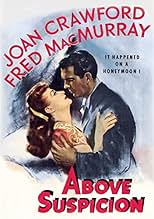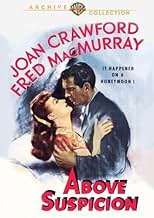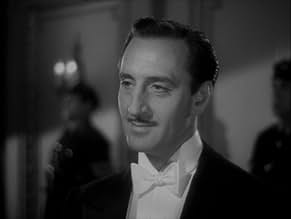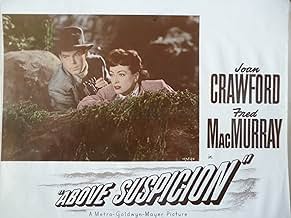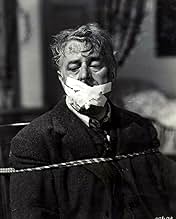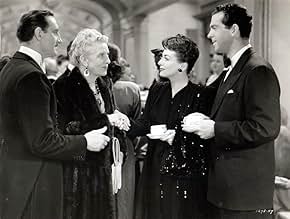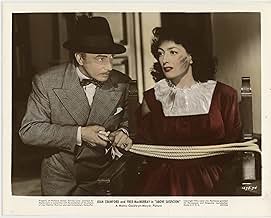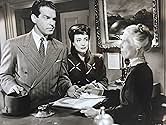Oxford Professor Richard Myles and his new bride Frances are off on a European honeymoon. It isn't the typical honeymoon: they are on a spying mission for British Intelligence on the eve of ... Read allOxford Professor Richard Myles and his new bride Frances are off on a European honeymoon. It isn't the typical honeymoon: they are on a spying mission for British Intelligence on the eve of World War II.Oxford Professor Richard Myles and his new bride Frances are off on a European honeymoon. It isn't the typical honeymoon: they are on a spying mission for British Intelligence on the eve of World War II.
- Awards
- 1 win total
- Ottilie
- (as Lotta Palfi)
- Student
- (uncredited)
- German Woman
- (uncredited)
- Poet at Frisky Rabbit
- (uncredited)
- Guide
- (uncredited)
- German Boy
- (uncredited)
Featured reviews
Good entertainment with some amusing dialogue and light-hearted performances by Joan and Fred that indicate they should have been teamed more than once. As it is, this is Joan Crawford's last film at Metro after seventeen years with the studio and comes just two years before "Mildred Pierce" at Warners. Good cast and fine production values make it an absorbing treat.
An odd movie even for its time, being clearly anti-Nazi and a bit of an American adventure on behalf of the British, but set in the months before the war began, earlier 1939. Yet it was made and was released in the thick of the war, four years later, well after even the Americans were involved. It must have seemed a bit lightweight at the time, and it certainly is a bit breezy now, too.
Joan Crawford is at her best when life is going wrong, when the screws are applied or when she has to be a tough and independent women. Here she plays a cheerful and rather carefree newlywed. What Crawford character is truly carefree? Well, in this case her husband is perfectly cast, because Fred MacMurray knows what carefree is better than anything. When the Nazi threat becomes violent, things turn out rather okay, at least at first. The only other actor of note is the Nazi figure, played by the guy who plays Sherlock in all those B-Movie Sherlock Holmes films, Basil Rathbone, and you can't quite make him out as the evil menace he needs to be.
Of course, our leading odd couple has been chosen for this mission by some knowing British officials who see the American innocence as a perfect cover for what is actually pretty dangerous stuff. And the movie, despite all these essential weaknesses, is really fun and a bit dramatic and very well made. Yes, it's a good movie, if far from a great one in either importance or effect.
The director, Richard Thorpe, is one of the step-in-when-needed guys with a bunch of B-movies under his belt, and an assortment of mediocre oddballs (a Tarzan movie, the last Thin Man, a Presley movie--Jailhouse Rock--some Westerns, and so on). It might be a miracle this is as workable as it is. The script is fair, but the mood and the setting is terrific. And really, as mismatched as they seem, Crawford and MacMurray are not half bad together. They certainly are trying very hard.
All that aside, this is still a topnotch suspense movie from World War II. The flick is fast-paced and has worn well with the passage of time, since all the goings on are now just history to most viewers. Since director Richard Thorpe was an old hand at directing action pictures he lets the show get on the road and move along rapidly. He throws humor in from time to time to ease the tension the way Hitchcock would do in a more masterful way. Viewers used to seeing Basil Rathbone play Sherlock Holmes will enjoy seeing him play a dastardly Nazi stooge who receives his just desserts. In the opposite direction viewers may also enjoy seeing Conrad Veidt playing a good guy who assists the newlyweds Frances and Richard Myles (Joan Crawford and Fred MacMurray)in their dangerous mission inside Nazi Germany. Those who enjoy World War II espionage films, should find this one a winner.
Did you know
- TriviaThis was the final film Joan Crawford made under her long-term contract with MGM, where she had been for the past eighteen years. Frustrated at being continuously offered what she considered second rate scripts, shortly after completing this, Crawford chose to buy out her studio contract (at great personal expense) and continue her career elsewhere. It was nearly two years later that she appeared in her next leading role, Le roman de Mildred Pierce (1945) at Warner Brothers, for which she won the 1945 Academy Award as Best Actress.
- GoofsThe song that represents Oxford in the film is the Eton Boating Song.
- Quotes
[on their wedding night, a policeman appears at the Myles's hotel room door demanding Richard's depart with him immediately]
Frances Myles: This is no time for a practical joke.
Const. Jones: It's no joke, ma'am.
Frances Myles: It's not practical, either.
- ConnectionsReferenced in Unfinished Business (1985)
- SoundtracksThe Wedding March
(1843) (uncredited)
from "A Midsummer Night's Dream, Op.61"
Music by Felix Mendelssohn
In the score after Frances and Richard's wedding
Details
- Runtime
- 1h 30m(90 min)
- Color
- Aspect ratio
- 1.37 : 1

